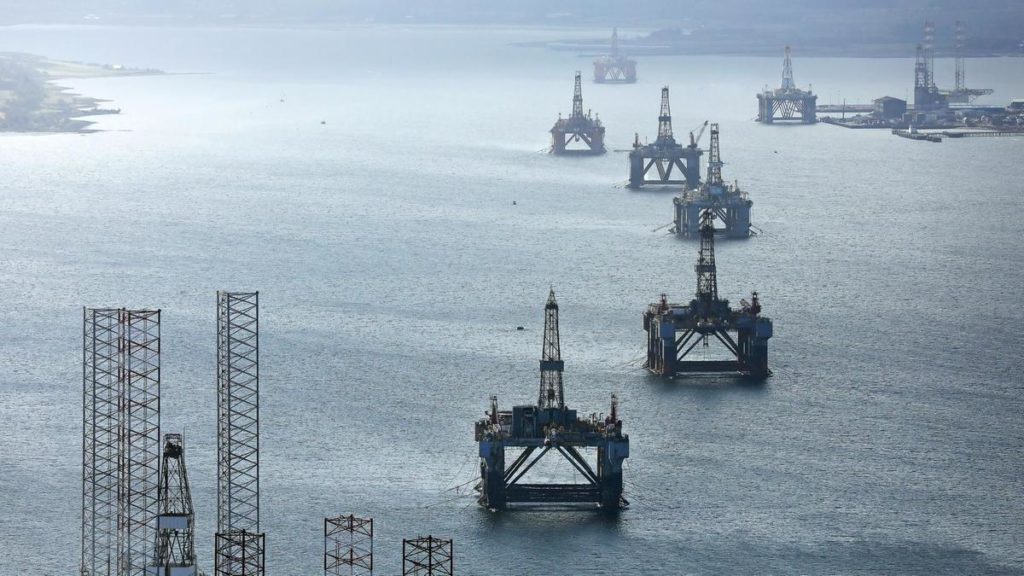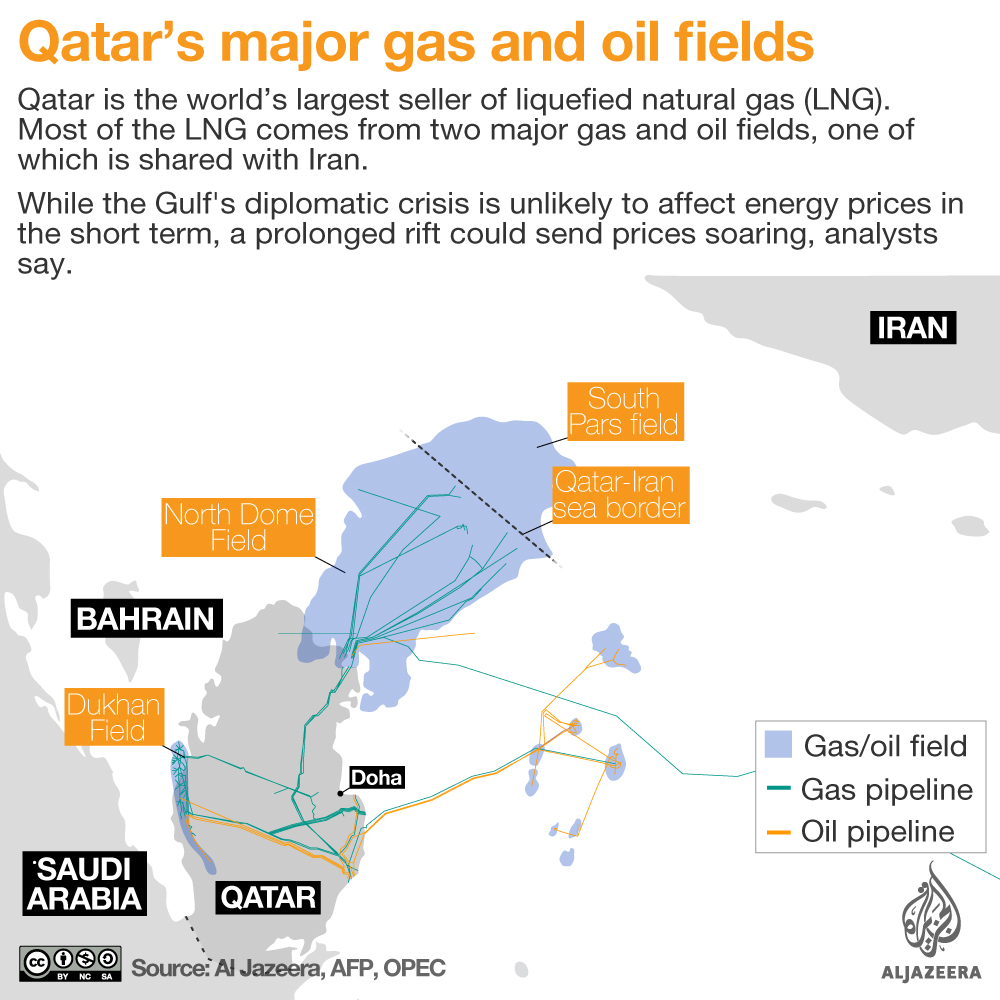On December 3rd, Qatar announced its plan to quit the Organization of the Petroleum Exporting Countries (OPEC) as of January 1st after being a member for over 60 years to focus on natural gas production.
The country’s state oil company, Qatar Petroleum, made the announcement in a series of tweets.
“The withdrawal decision reflects Qatar’s desire to focus its efforts on plans to develop and increase its natural gas production,” Saad Sherida Al-Kaabi, the country’s newly-appointed minister of state for energy affairs was cited.
Qatar has been subject to a diplomatic and economic embargo by its neighbors, including OPEC members Saudi Arabia and the United Arab Emirates for the past 18 months. As a response, the country has been increasing gas production.
In 2011, reserves of natural gas in Qatar were measured at approximately 896 trillion cubic feet (25.4 trillion cubic metres), or 14% of all known natural-gas reserves in the world. They are the third largest, following Russia and Iran. In 2006, Qatar reportedly surpassed Indonesia to become the largest exporter of LNG in the world. Its exports currently account for about 30% of global demand.
OPEC has no role in the global natural gas market, and Qatar made no reference to the dispute with its neighbors in the announcement.
“Achieving our ambitious growth strategy will undoubtedly require focused efforts, commitment and dedication to maintain and strengthen Qatar’s position as the leading natural gas producer,” Al-Kaabi said.
Qatar is not a major producer in OPEC, especially compared to Iraq and Saudi Arabia. It pumps about 600,000 barrels of oil a day out of more than 27 million from all OPEC members.
Source: CNN
Despite Al-Kaabi’s claims that Doha did not make the decision due to the blockade, experts believe that it may be the underlying reason.
“More than anything, we suspect that Qatar’s withdrawal from OPEC has been spurred by its ongoing dispute with Saudi Arabia and its allies,” Jason Tuvey, Capital Economics’ senior emerging markets economist was cited by Al Jazeera.
“Qatar sought to reduce its exposure to Saudi oil policy and Saudi Arabia generally since the 1990s when the two countries first clashed over border disputes.Today, in light of the Saudi-led blockade against Doha, ensuring Qatar’s natural gas industry is independent of Saudi decision making on oil is all the more pressing,” Amy Myers Jaffe, a senior fellow at the Council on Foreign Relations told Al Jazeera.
Ellen Wald, senior fellow at the Atlantic Council’s Global Energy Center claimed that Qatar’s departure might be a bad sign, as oil policy becomes more concentrated in the hands of Saudi Arabia and non-OPEC member Russia. Naturally, Atlantic Council fellows miss no chance to attack Russia, even if a situation may not be related to the country.
“It could signal that smaller producers are growing disgruntled with the cartel’s dominance by Saudi Arabia and Russia,” said Wald. “If a group of small producers decide to exit the cartel it will decrease OPEC’s influence in the market.”
In an article published on OilPrice.com, Dr. Cyril Widdershoven criticized Qatar’s “illogical decision” to leave OPEC.
“Regardless of how significant one considers Qatar’s decision, it is hard to view it as a very rational one. As one of OPEC’s most vocal members, Qatar had a say far beyond its real economic or military capabilities. By shaping OPEC’s strategy, Doha played a pivotal role on the global stage. Leaving OPEC will immediately result in it losing this influence. Shifting focus from OPEC to maintaining its status as an LNG powerhouse is maybe economically rational, but it could end up costing Qatar geopolitical leverage. Except for Russia, ‘gas geopolitics’ is not a real power factor taken into account by global powers or military strategists. Being part of the ‘decision-making’ group within OPEC is most of the time the key to the White House, the Kremlin or Brussels. Having an insight and a say at the table of OPEC ministers grants nations a great deal of power.”
There is still a lot unclear regarding why Qatar made the decision. According to its energy minister it was to focus on its gas production. Other versions come down to speculation.









OPEC was created to protect producing countries’ interests against the large oil corporations. Before OPEC they basically produced for free for 7 sisters (even now if you add the price of crude, refining, shipment, etc., the price which you pay for oil-derived energy and products is much higher than it should be). Based on OPEC’s charter, all decisions must be unanimous, all must agree or there’s no decision. Not anymore.
Qatar has problems with KSA but perhaps their decision to leave OPEC is not because of blockade.
The problem that most of small producers in OPEC have is the strategy of increase and decrease in production and the recent decision making process of OPEC and OPEC+, where three countries (the US, KSA and Russia, all acting according to the US viewpoints on the market and their anticipation of it’s production rate, decide for all (countries like UAE, Kuwait, to a degree Iraq and non-OPEC Oman follow Saudis anyway. These 7 countries produce more than %50 of all crude production).
When decided to increase the oil flow, most of increase disproportionately went to a couple of countries, but now that they decide to lower the production, they ask everybody to decrease, while a fair decision would be to decrease based on the percentage of increase. That is a source of concern for smaller members as it heavily affects their income for the worse.
Qatar although is the first OPEC member besides it’s founders (Iran, Iraq, Kuwait, Saudi Arabia and Venezuela) is not a major crude exporter and their leave is more of a symbolic move as 500-600 k bpd will not affect the market much, but it shows a crack in the organization and there is a possibility that some other members that are kept from the decision-making process (the whole idea behind OPEC) may follow.
Nice comment. Out of interest, have you ever watched the 7 sisters video; well worth watching…it basically tells you the history of the Oil & Gas industry (mainly in the ME) + the hell due it it.
It is long, but you can get it in a 4 part series if you want – https://www.youtube.com/watch?v=XtYOjMmEMeg
Thank you. I bookmarked the video to check it out.
It sounds like the Saudis were using OPEC to give Qatar problems, but this may have benefits or back lash. OPEC set production quotas to keep prices stable and reduce competition between states. Which means if it’s removed we may have some healthy competition, where all states try to produce as efficiently as possible to please the buyers (good for fuel prices). Or we may have extreme competition where both sides intentionally sabotage the other’s production and sale (seriously, don’t put that past these guys).
Qatar To Leave OPEC As Of January 1st, 2019
breaking news from janiary 2nd, 2019
The WW3 has begun!
Like a politician who quits to “spend more time with family”, you can be certain that there is more to the story.
OPEC was an American idea, to formalize all oil sales in US dollars.